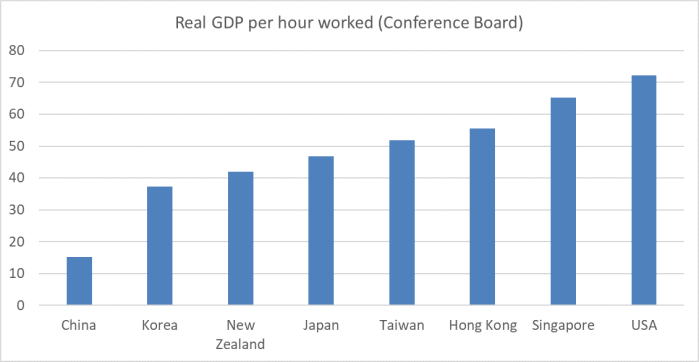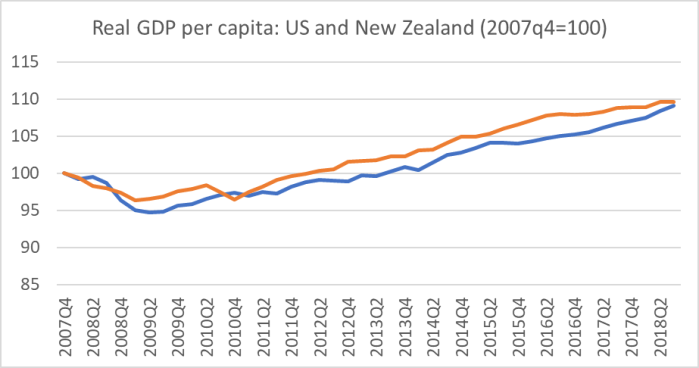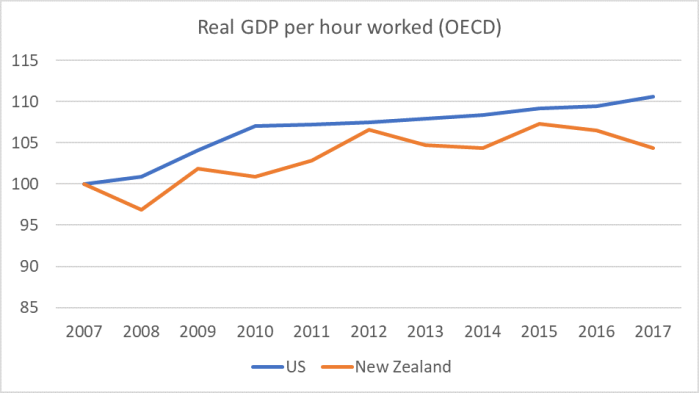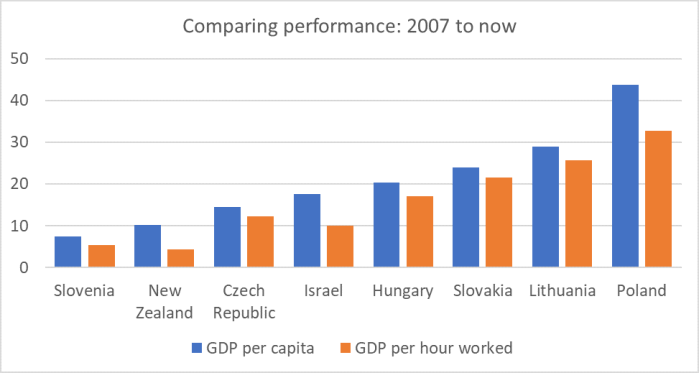Or not.
The title to this post was taken from the latest column from veteran political journalist Barry Soper. Apparently he had had some readers get in touch, not entirely convinced by his PRC-related articles earlier in the week.
They all ignore the fact that this country has prospered over the past decade, while other economies have suffered.
The Key Government’s management of the global financial crisis has been lauded but without the free trade agreement, signed in the Chinese capital as the final act of the Clark Government, this country wouldn’t be where it is today.
The puerile keyboard warriors’ bile is too vile to repeat but it seems to be based on envy, that the Chinese, after generations of deprivation, have shown the world they can compete and are a force to be reckoned with.
I’m not sure quite what he bases these assertions on (although it is the sort of line that less well-grounded champions of Beijing, including former Foreign Minister, Murray McCully, have repeatedly tried to run). “Be grateful, peasants” seems to be the tone, for the CCP in Beijing has graciously bestowed its bounty upon you.
I don’t want to waste much time on the alleged PRC success story. When you do so much damage to yourself, and then stop the self-destruction, of course you’ve got plenty of ground to make-up, and with half-decent policies you can do some of that quite quickly. Here are the latest Conference Board productivity estimates.

The PRC……not even half the levels of Korea or (decades of underperformance) New Zealand, not a third of Taiwan or a quarter of Singapore. Who could possibly envy that sort of performance? There was no obvious reason why China could not have matched the performance of Korea, Japan, or Taiwan. Except that they chose to adopt, and continue to run, a system that consistently produces poor economic results.
But what I was really interested in was the assertion that New Zealand has had a really good economic performance over the last decade “while other economies have suffered”. I guess if Greece, or even Italy, is your benchmark it isn’t too far wrong. But then almost everyone does better than those troubled euro-crippled economies.
One comparison I like, and which I’ve run before, is between New Zealand and the United States. Were there anything to the “we owe such a debt to Beijing, and have done so well ourselves” story, an obvious place to look might be a comparison with the United States. After all, the US was the epicentre of the financial crisis itself, their central bank got to the limits of what it could do, and no one thinks Beijing someone “saved” the US. And yet here is how real GDP per capita compares across the two countries since late 2007, when the last recession began.

We’ve mostly done very slightly better than the US over the decade or so, but there really isn’t much in it. Certainly not a case of the US suffering and us “prospering”, whether thanks to Beijing or any other cause.
And to the extent we’ve done a touch better, it certainly isn’t reflecting stronger productivity growth. The data are indexed to 100 in 2007.

It isn’t just an us versus the US comparison either. Over that decade, real GDP per hour worked rose by 4.4 per cent, but in the median OECD country productivity growth was 8.9 per cent.
And if Beijing and the (so-called) free trade agreement were the source of any special New Zealand prosperity, exports might be an obvious place to look. Except that over the previous decade New Zealand exports actually fell a little as a share of GDP. In the United States, and in all but a handful of other OECD countries, exports became a larger share of the economy.
Even on more purely cyclical measures, New Zealand still doesn’t stand out (at least on the good side). The unemployment, for example, has come down a long way, but it is still quite a bit above the lows reached before the recession (at a time when demographics will be tending to lower the “natural” rate of unemployment). In the United States, by contrast, the unemployment rate is below pre-recession levels. That is also true across the G7 as a whole, the EU as a whole, and the OECD as a whole (individual bad euro-area countries notwithstanding).
And if you don’t like the idea of comparing against the US – even though it was the centre of crisis, and doesn’t owe anything in particular to Beijing – here is how we’ve done against another group of countries, each now with productivity levels similar to those in New Zealand (and few doing much trade with the PRC). Since all these countries started (in 2007) with productivity well behind global frontiers, all should have been able to do okay even if productivity growth at the frontier (eg US and northwest Europe) slowed.

Many did pretty well. As for us – Beijing (alleged) beneficence notwithstanding – either worst or second worst depending on your preferred measure.
As I noted earlier on, there are countries that have done a great deal worse than us. But the suggestion that we have “prospered” over the last decade – in some way materially outstripping the rest of the advanced world – isn’t just a myth. It is worse than that. And the people who run the story, whether as senior journalists or senior politicians should know better.
Countries mostly make their own prosperity. We once did – those decades when we really did lead the world. We could again, although that might involve facing facts. But these days politicians and their acolytes in the media seem more interested in playing distraction; in this case continuing to corrupt our system, supported by motivated fantasy stories about our (alleged) success and our (alleged) debt to Beijing.
The peasants are getting restless living in their overpriced rental accommodation, cars and on the streets; those of you on the property ladder can’t, or rather, don’t want to see it, which is myopic in the extreme, because those children that you are so lucky to be able to afford to have will be fighting for their lives in NZ Wars II. No Zealand is not a country, it is a territory beholden to the largest dictatorship in the planet’s history, populated by nearly 50% lucky owners, mainly foreign and elderly, and 50% underclass, predominantly young and local. Just add water (or not).
LikeLike
That is why the government pays out to help the peasants with a $2.8 billion a year in social housing and accomodation supplement. If the government removes its $400 million racist preferential Maori Waitangi Tribunal settlements negotiations this year then the social housing and accomodation supplements could be $3.2 billion.
The government also pays out $25 billion or 24% of its tax revenue for Social Welfare plus another additional $1.3 billion specifically(racist specific) for Maori development and Oranga Tamariki(whatever that means but it sounds like some Maori specific thing)
https://www.interest.co.nz/news/93792/budget-2018-summary-all-spending-plans
LikeLike
Surely a country that needs to pay accommodation supplements to a person with a full time job is not particularly successful. It is not the amount, but the fact it is even needed for survival.
LikeLiked by 3 people
Oranga Tamariki is the new name for the Ministry for Vulnerable Children. They stuck with the Māori name because it was easier and cheaper than a full rebrand.
LikeLiked by 1 person
Try Te Tari Take
LikeLike
The peasants do not benefit from accomodation supplement – the landlords and associated ticket clippers do.
LikeLike
I would happily rent my 1 of 11 properties to some other market rent capable tenant if that 1 tenant on the accommodation supplement can’t pay market rents. Therefore accommodation supplements benefit tenants to help them get out of the streets. The alternative is for the government to build more social houses which it has proven it can’t build.
LikeLike
I for one am getting a little tired of “the economy is awesome, we are so special” line that is being run in the media and the House. I’d really like to see an evidence-based rebuttal of this column (i.e. one that doesn’t play distraction and make sweeping assertions, and one that pits data against data, and different measures of prosperity against each other) because I’ve yet to see one. In the absence of one, I’ll continue to believe Mr Reddell’s analysis.
Will anyone take me up on this? A reasoned and evidence-based conversation is very important, and it’s lacking.
LikeLiked by 1 person
3% GDP is still growth and still one of the highest in the OECD. Thats a fact.
LikeLike
And, as you know, we’ve had one of the fastest population growth rates in the OECD over recent years. That’s why most dispassionate observers focus on per capita numbers when attempting international comparisons.
LikeLiked by 2 people
Per Capita GDP has improved when Statistics NZ revised their population numbers down and annual net migration from 60k to 40k. Problem solved.
LikeLike
The new methodology numbers have been known for some time (and presumably in the SNZ population estimates), but are really only useful with a 16 month lag. The current contemporaneous estimates have huge margins of error and are barely worth the paper they are printed on.
https://croakingcassandra.com/2018/08/28/do-they-expect-to-be-taken-seriously/
of course, we have a bigger problem with our population numbers: the utter disaster that the SNZ-conducted census seems to have been,
LikeLiked by 1 person
Not too worry. I have just heard that NZ is now not ranked in China’s official top 10 country destinations for chinese tourists and a Hong Kong to NZ flight has just cancelled due to the decline in the passenger numbers to NZ.
A Salmon shipment to China has already been subject to intense checks by China customs and the delay could cause the freshness of the product to be then questioned by Customs after the delay.
Fewer tourists means lower immigrant workers. And cheaper food and fruits for us in the domestic market.
Also time to short sell Auckland Airport shares, Air NZ and Sealord Fisheries etc.
All good.
LikeLike
If I were to make the best possible counter to my argument, I might emphasise:
– the earthquakes. Even though they added a lot to demand, they diverted resources and policy energy away from other sectors. Who knows how different things would otherwise have been, but the earthquakes were 8 years ago now, and peak rebuild spend passed several years ago,
– the relatively strong employment to population ratio performance (per capita growth has been reasonable – similar to US – even as productivity as done badly because we’ve simply thrown more labour at the situation. But to an economist labour is an additional input, and there is nothing particular virtuous about working longer or having more people working (provided the unemployment rate is tolerably low – and, see the post, we’ve not done that well on that score),
– and I’d point to the terms of trade, which have been strong. Some of that has been about China but (as with Australia) it is mostly about overall Chinese demand for resources and commodities, not something particularly specific to NZ. It isn’t as if the PRC authorities suddenly decided that kids would need milk: a big population and self-inflicted trust disasters like Sanlu helped create that sort of global demand. If for some reason Chinese buyers hadn’t purchased NZ milk powder, they’d have to found supply elsewhere in the global market. This is not to dispute that improved access under the “FTA” helped, but any effect just wasn’t large enough to make that much difference across the whole economy.
There is no doubt that the huge PRC fiscal/credit boom from 2009 did add to global demand at a time when global demand was v subdued, and many countries had run out of mon pol capacity. But even that was less of a consideration for NZ (or Aus) since at the time our policy interest rates never got below 2.5% (a bit lower later), so if demand had been scarce we could have cut the OCR further (or, arguably – and I’m less convinced of that given the earthquakes) fiscal policy.
Recall too that the share of NZ trade with the PRC is not particularly or unusually large,
LikeLiked by 4 people
The Earthquakes should have been funded out of debt with a special issuance of a Earthquake recovery bond. A mini QE could have ensured that the government was sufficiently funded for normal operational needs like staff pay increments and basic services infrastructure projects. It was also an opportune time as other central banks were in the midst of their own QE. Bad call by the RBNZ. Another feral moment.
LikeLike
There are 34 OECD countries. On GDP per capita how many are worse off and how many better off than NZ?
Mr Soper says “” the Chinese, after generations of deprivation…””. My impression is that China despite its authoritarian communist government still has a considerable with deprivation. Do they have an equivalent to our superannuation and how do their elderly survive after decades of their single child policy?
Judging by a GDP per hour worked that is a miserable fraction of ours or Taiwans they should be spreading wealth as evenly as possible not creating billionaires.
LikeLike
Check the chart in my post from Wednesday: 11 OECD countries have productivity levels lower than ours. We do a touch better on GDP per capita because the average NZers works more hours than the average OECD resident.
Here is a short OECD note on the PRC pension system. In decades past, big firms were responsible for their own workers (health, pension, accommodation etc) incl retirees, and of course peasants had land in their home village (or as part of a forced commune).
I’d be wary of drawing the egalitarian conclusion in your final para – there were huge indiv fortunes made in the 19th C as the UK and US emerged. Then again, being a PRC billionaire is a risky business (vis-a-vis the state)
https://www.forbes.com/sites/kerryadolan/2016/10/26/why-being-a-billionaire-in-china-comes-with-the-risk-of-disappearance-arrest-or-worse/#235fbf371bfb
LikeLike
I read a similar op-ed on the NZH the other day, promoted on Twitter by Fran O’Sullivan, that was so bad it made my eyes bleed. There’s a whole generation of NZ journalists that needs to be pensioned off.
LikeLiked by 2 people
This is my immigrants view: life in NZ is pretty good. Few places better for retirement. So I am staying and I do have the choice. I’m worried my working children will go overseas and simply beause they can earn more and find cheaper accommodation in Australia or Europe.
Immigrants do make rather over-proud citizens; I’m like asking my Scottish, English, South African and Australian friends how they rate their chances against the All-Blacks at rugby. Looking at your charts I can boast about Kiwi growth in GDP per capita but only if I can find a Slovene and don’t mention the hours worked for that GDP growth.
LikeLiked by 1 person
Indeed. My daughter will spend 2 years in wage paid training in the UK. She intends to work in Australia after as the wages aere 30% higher than NZ for similar job specifications.
LikeLiked by 1 person
In the past it was France that behaved like petulant schoolgirls. With killing a critic of France in NZ and economic blackmail to get their murders back. And France specialised in non-tariff barriers with Japanese electrical goods processed for safety approval in a small office tucked away in the Alps. Fortunately the French have grown up. Maybe China will too and at least Anne-Marie Brady is still alive which is a good sign. But China is less likely to behave responsibly if countries succumb to their game playing.
https://www.newsroom.co.nz/2019/02/12/440420/nz-china-scheduling-issues-cause-for-concern
LikeLiked by 2 people
Now https://www.radionz.co.nz/news/business/382560/sanford-shipments-delayed-at-china-ports
after the rotting salmon it ends with this paragraph: “” China’s Auckland consulate has been issuing notices warning the country’s tourists of problems in New Zealand, such as robberies, a lack of police help and people with valid visas being refused entry. “” My touble with that quote is it seems accurate ~ Tourists are robbed, the police are pleasant but usually ineffective for robberies and INZ is a wonderous bureaucracy with a proven track record of incompetance in issuing Visitor Visas.
Our govt should reimburse innocent companies like Sanford that are being messed around by China.
LikeLike
You have to be joking. Another taxpayer subsidy to the primary industries? If they can’t sell their salmon to China then too bad. It would be nice to see salmon on my dinner table at cheaper prices instead.
LikeLike
Yes, the Beijing apologists were out in force this week, notably Liam Dann with his sycophantic articles with David Mohan.
On a different note, it will be interesting to see what the PMI for Services delivers us next week. At present, it, and the ANZ ‘own activity’ index – adjusted for the negative bias of businesses towards a centre-left government – point to real GDP growth slowing to around 1.5%y/y by mid-2015. The simple fact is, the economy is already slowing to a pace below the Reserve Bank’s alternative rate cut scenario.
The RBNZ played up Kiwibuild and the fiscal impulse but the fact is the Government increased spending significantly in early 2018 and the economy is spluttering. Rather than think “how much of a boost will this deliver us” the policymakers should be thinking “gosh, performance was poor despite the stimulus and the stimulus impulse is going to start fading in a few months (and certainly in the 6-18 month window the RBNZ is supposedly targeting).
Yet we are all expected to continue to say that everything is awesome like we are we are in some Kabuki play.
LikeLike
It reminds me a bit of rather complacent RB attitudes to the econ situation in the first half of 2008.
LikeLike
That’s wrong. The RBNZ had gone complacent by early 2005 and absolutely bonkers and feral by October 2005 with another 2 rate increases.
Banks Floating interest rates by early 2005 had already climbed to 9.5% which is unsustainable for most businesses. Longer term fixed interest rates around 7% due to negative interest rate yield curve meant that the RBNZ was getting a delayed effect from its aggressive OCR actions.
LikeLike
The problem is that by early 2005 commercial business working capital overdraft interest rates was riding up to 10.5% and 11%. Business profits was being severely eroded and being forced to borrow against their residential homes to fund losses in their business profits.
LikeLike
that should read mid-2019… fat fingers 🙂
LikeLike
That should read “mid-2019” not “mid-2015” – guess I am getting old?
LikeLike
Ministers and officials have indulged for the past decade in the self-serving fantasy that the “special relationship” with China, with the FTA at its heart, is a testimony to their prescience and sound management which must never be questioned. Some are also doing very well personally thank you from their China connections as consultants, commentators or board members. And yet the FTA was a very unequal treaty. Chinese nationals could buy land in New Zealand but we could not buy land there; large numbers of Chinese nationals were permitted to take jobs here while tight restrictions remained on New Zealanders in China; even much of our dairy trade remained subject to tariffs to be only progressively lifted. I believe China would have bought our milk powder whether we had an FTA or not. Their demand was voracious and we turned much of our country into an open sewer and indulged in cruel practices like aborting late-term calves to meet it. When Fonterra however tried to invest in China to develop the relationship further the results were catastrophic and farmers are still paying for that through much reduced payouts. In the meantime all the political humbug about the special relationship has made us very vulnerable to pressure from China. We have spun a web of self-delusion about China and now the creature at its centre is flexing its sting. It’s time to escape from the China delusion by sobering up and setting some clear boundaries around the relationship.
LikeLiked by 1 person
Peter Wilson today for RNZ:
“There are reasons for China to feel aggrieved. No evidence has been produced that Huawei’s equipment is used for spying and it is already here in existing networks” “Britain’s security agencies are reported to use it, apparently without concern.”
Apparently the assurance of China, an incontrovertible cyber and intelligence adversary of the west, is more trustworthy than New Zealanders in the intelligence community. The second statement is demonstrably false.
LikeLike
It will be very interesting to see how Ardern-Peters handle this imbroglio
What is distasteful is Sandford being damaged for Huawei-FiveEyes etc
That’s the way the PRC business – It’s not the NZ way
The PRC have just demonstrated the controls they have including Huawei
LikeLiked by 1 person
The NZ way is to damage our own industries. Capital Gains tax would just strip owners equity for the government to squander in think big projects like mulching a billion trees.
LikeLike
NZ is the only British Colonial country without a CGT – which you claim as an advantage
So why aren’t NZ businesses swimming in that Tax Free Benefit
And cleaning up globally and export-wise and productivity-wise
Be more meaningful if you gave both the positive case and negative case at the same time
LikeLiked by 1 person
The Bright line test is a CGT. It is a lie that we don’t have CGT.
LikeLike
It’s not only New Zealand that has to navigate this sort of thing – it seems to happen the world over:
View at Medium.com
New Zealand can likely lay claim to more useful idiots within the commentariat / media establishment whipping themselves into a frenzy than most countries it seems though.
LikeLiked by 1 person
Comparing on a measure of GDP is quite misleading because it depends on what sector of the economy the GDP occurs. I suspect the difference between NZ and USA would be quite interesting in this regard.
LikeLike
The US does have the largest arms and munitions manufacturing sector in the world which NZ does not have. A world in violent conflict does help boost this sector.
LikeLike
Doesn’t seem to have dented the currency any though…
LikeLike